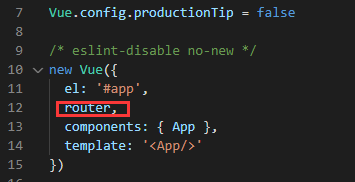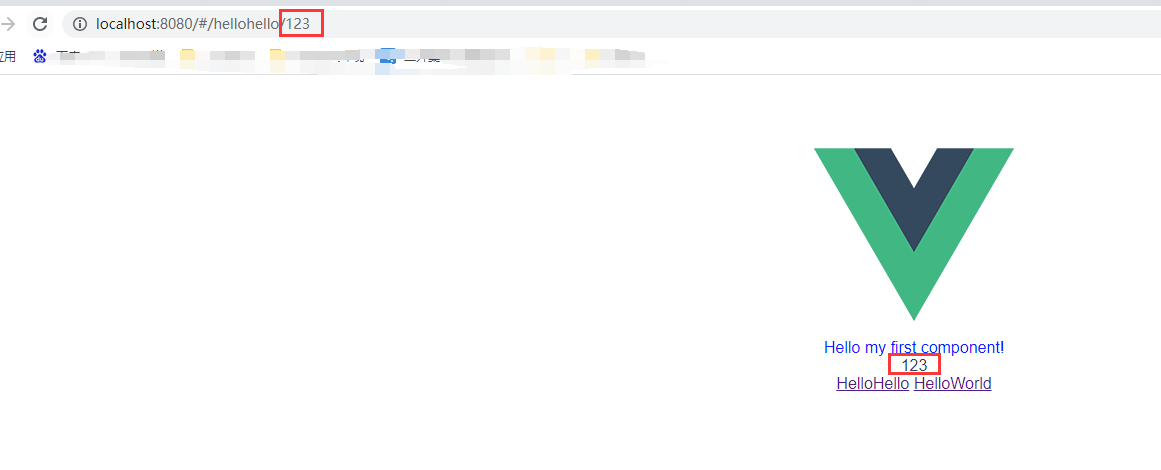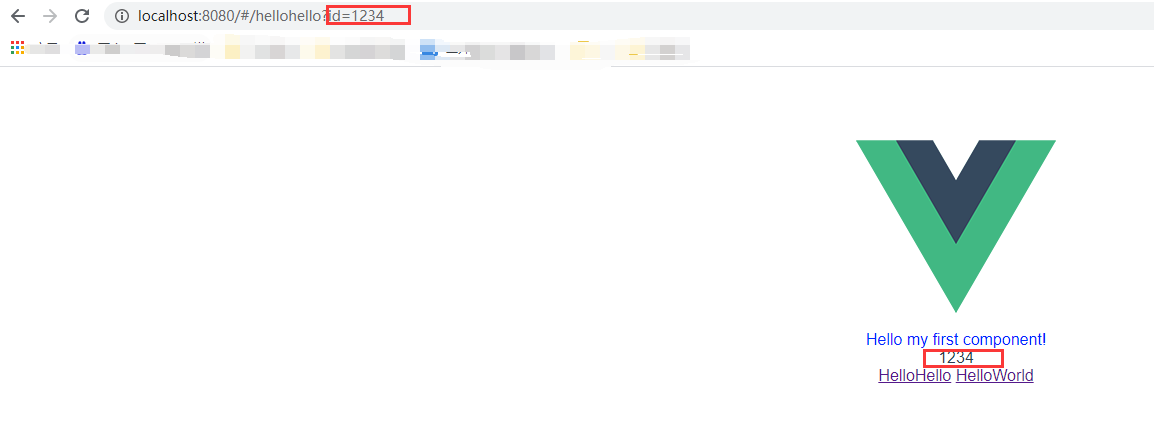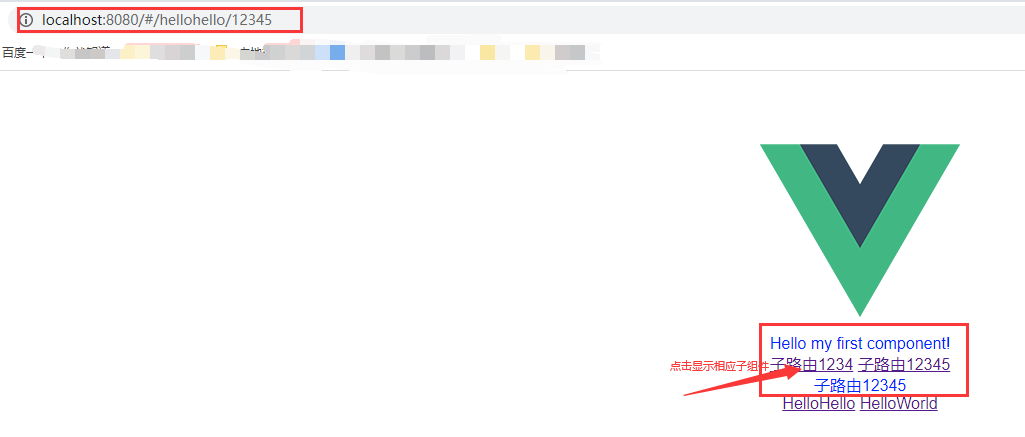<九>组件和路由
页面的跳转,在html里都是通过a元素来进行页面跳转的,href指定的链接就相当于指定了跳转的路由。
而在vue的单页面应用中,这里的路由本质上是进行了页面重渲染。
在入口main.js里面已经将router装载进项目了。

1、在定义新的路由之前,先定义一个跳转的自定义组件。在src/components下新建一个Hello.vue
<template> <div class='hello'>{{msg}}</div> </template> <script> export default { //这个标志提供给外部引用 name: 'Hello', data () { return { msg: 'Hello my first component!' } }, } </script> <style> .hello{ color: rgb(0, 38, 255) } </style>
2、组件是可以引入其他组件的,比如在创建一个组件叫HelloHello
<template>
<hello></hello> //最后在组件的template中使用组件
</template>
<script>
import Hello from '@/components/Hello' //import来导入组件,,最后在组件的template中使用组件
export default {
name: 'HelloHello',
components: { //用components来声明使用组件
Hello
}
}
</script>
3、组件弄好了,那就来定义一个新的路由,打开router文件夹下的index.js文件。
import Vue from 'vue' import Router from 'vue-router' import HelloWorld from '@/components/HelloWorld' import HelloHello from '@/compoonets/HelloHello' //引入组件 Vue.use(Router) export default new Router({ routes: [ { path: '/', name: 'HelloWorld', component: HelloWorld }, { path: '/HelloHello', //定义路由 name: 'HelloHello', //路由名称 component: HelloHello //绑定跳转组件 } ] })
4、在根组件app.vue中使用<router-link></router-link> 元素进行路由跳转绑定
<template> <div id="app"> <img src="./assets/logo.png"> <router-view></router-view> <router-link to="/HelloHello">HelloHello</router-link> <router-link to="/">HelloWorld</router-link> </div> </template> <script> export default { name: 'App' } </script>
生成一下,发现有一些错误。代码上的要求挺严格

修改完成后,点击HelloHello显示Hello的组件,点击HelloWorld显示HelloWorld组件的内容。

5、动态路径参数,顾名思义就是在路由指定某些参数,类似于http://www.baidu.com/1234这种
定义路由时指定参数名id,格式是冒号+参数名
{ path: '/hellohello/:id', name: 'HelloHello', component: HelloHello }
使用:this.$route.params.参数名 来获取参数。在HelloHello.vue里添加显示这个id的div
<template>
<div>
<hello></hello>
<div>{{this.$route.params.id}}</div>
</div>
</template>
在根组件的跳转路由里天上值
<router-link to="/hellohello/123">HelloHello</router-link>
最后显示的结果

6、查询参数,相当于http://www.baidu.com?id=1234 这种,定义使用query: { userId: 123 } 添加参数
在根组件的跳转路由里声明查询参数
<router-link :to="{path: '/hellohello',query:{id :'1234'}}" >HelloHello</router-link>
使用:this.$route.query.参数名 来获取参数。在HelloHello.vue里添加显示这个id的div
<template>
<div>
<hello></hello>
<div>{{this.$route.query.id}}</div>
</div>
</template>
结果

7、嵌套路由:嵌套路由就是在一个被路由过来的页面下可以继续使用路由,嵌套也就是路由中的路由的意思。即子组件里面也可以使用<router-view>显示其他组件。
先给路由添加嵌套路由,记得引进用子组件
{ path: '/hellohello', name: 'HelloHello', component: HelloHello, children: [ { path: '1234', component: a1234 }, { path: '12345', component: a12345 }] }
在子组件里声明需要嵌套的路由信息
<template>
<div>
<hello></hello>
<router-link to="/hellohello/1234">子路由1234</router-link>
<router-link to="/hellohello/12345">子路由12345</router-link>
<router-view></router-view>
</div>
</template>
上面声明了两个子路由指定了两个组件,那么这两个组件也定义新建一下,在componts下
<template> <div> <div class='hello'>子路由1234</div> </div> </template> <script> export default { name: '1234', data () { } }
<template> <div> <div class='hello'>子路由12345</div> </div> </template> <script> export default { name: '12345', data () { } }
这样就完成了,运行一下

8、编程时导航路由:即通过编写代码来实现路由的跳转。this.$router.push('path');会把当前的组件替换掉。
在hellohello.vue新增一个button按钮,用于触发点击事件,绑定方法用于动态变更路由
<template>
<div>
<hello></hello>
<button @click="trun">点击</button>
<router-view></router-view>
</div>
</template>
<script>
import Hello from '@/components/Hello'
export default {
name: 'HelloHello',
components: {
Hello
},
methods: {
trun () {
this.$router.push('12345') // 根据路由的path来跳转
// this.$router.push({name: '12345'}) // 根据路由的name来跳转
// this.$router.push({ name: '12345', params: { id: '123' }})
// 上一行是根据路由的name来跳转,带路径参数,要求path带路径参数[如果提供了 path,params 会被忽略]
//this.$router.push({path: '/12345', query: {id: 123}}) // 带查询参数
}
}
}
</script>
再给组件12345定义一个路由
{ path: '/12345', name: '12345', component: a12345 }
保存,运行





